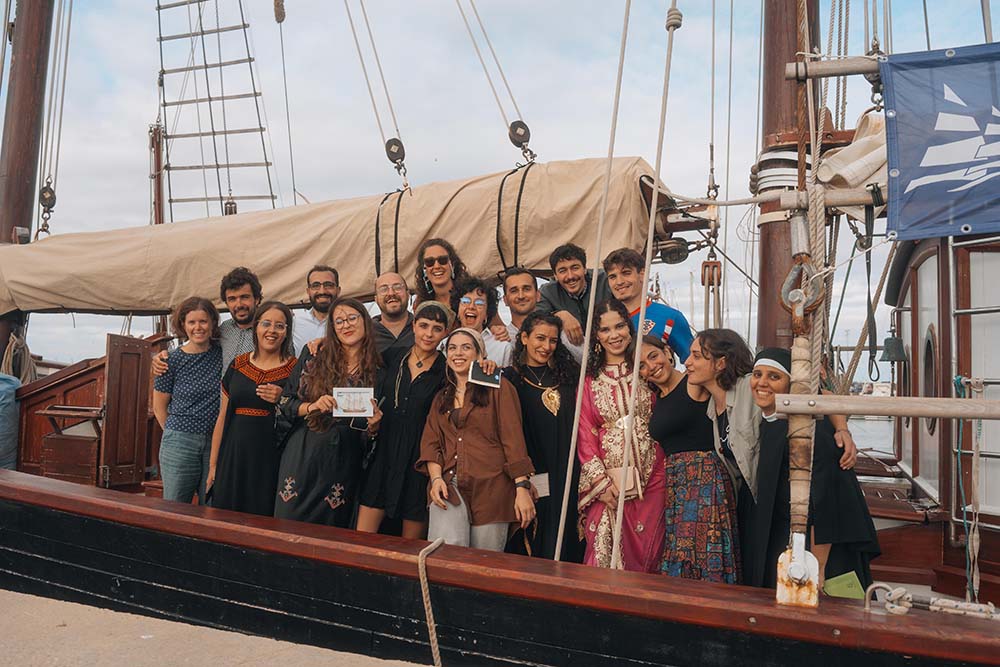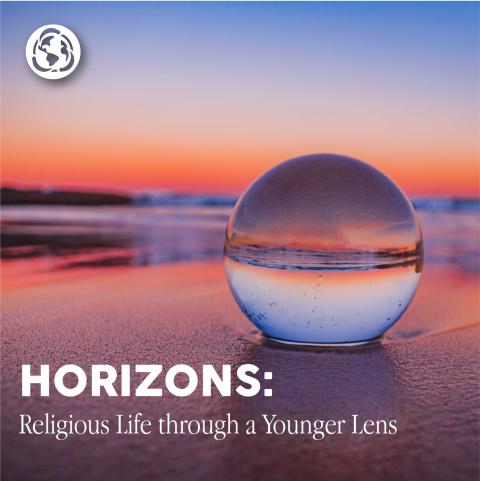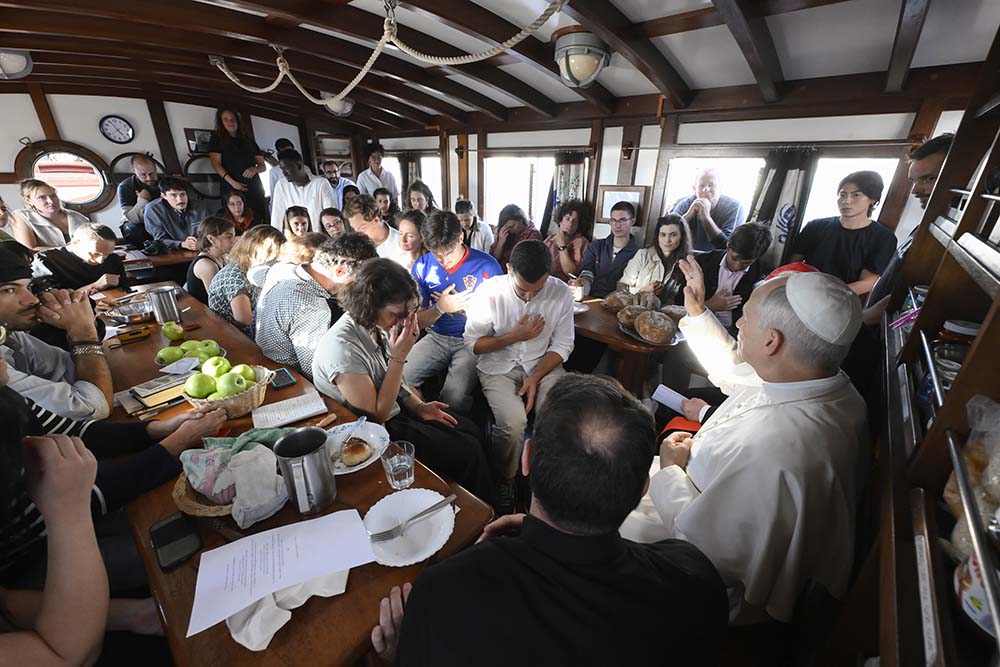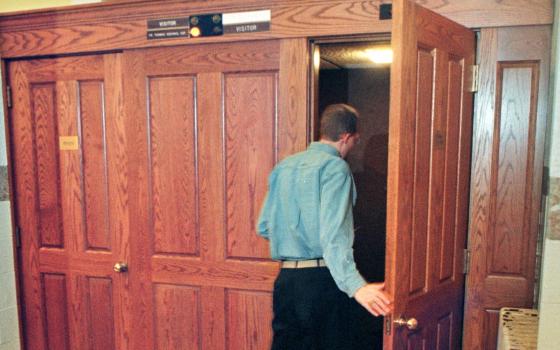
A group of young participants in the final stage of the Bel Espoir voyage poses with Sr. Abir Hanna, coordinator of the network of monasteries that accompanied the youth. (Courtesy of Jesús Marro Sanz)

In the same waters where more than 1,000 people have died so far this year, the Bel Espoir sailed for eight months, from March to October. These waters reach the shores of lands wounded by conflicts as painful as that of Israel and Palestine, where the great religions of humanity converge.
The Bel Espoir is a small vessel that welcomes young people from different countries along the Mediterranean, with varied cultures, languages, religions and life stories. Up to 200 young people took part in the eight stages of navigation across the Mediterranean Sea, stopping in 30 key cities along its coasts.
The purpose was to create a "school of peace" in practice, experiencing the richness and the challenge of diversity by living together in the tight space of a boat.
"The goal has been to create a community without differences, beginning with our shared desire for peace. The experience we have had is like a life tattoo; we cannot return to our own realities without using what we have learned," Bochra tells me. She is a 27-year-old Algerian who participated in the final stage, from Naples to Marseille. She is a doctor and has been part of the Mediterranean Meetings for years. Through them, she came to the experience of the Bel Espoir.
Advertisement
The Mediterranean Meetings began in 2020 in Bari. They were organized by the Italian Bishops' Conference after Pope Francis' visit, during which he urged the leaders of the Christian churches to work for peace. In his address, titled "Mediterranean, Frontier of Peace," Francis spoke of the meaning of this sea. He said that by connecting shores of such diverse places, it "forces surrounding peoples and cultures to constant interact" and reminds them that only by living in harmony can they enjoy the opportunities this region offers in terms of resources, the beauty of the land and its varied human traditions.
Five years later, as a result of the work carried out in these encounters, the Bel Espoir set sail. The objective was to show the world that diversity does not divide, but can generate something new and valuable. This was one of the reasons that moved Jesús Marro Sanz, a 31-year-old Catalan and also a doctor, to join the voyage.
"I have always been open to meeting people from other places, learning from other cultures and understanding the conflicts that take place in the world," he explains.
For Marro Sanz, the boat offered an experience deeper than any theory. "The encounter with people who have suffered more has been a gift." He recalls, for example, a young man from Ivory Coast who shared how he migrated in a small boat, saw people die at sea and arrived in Italy with nothing. "Living so closely with him made me aware that it is not something distant and that we are not so different."
Bochra speaks in similar terms. "These people become family. I received so much love from people I didn't know. I think everyone should have this kind of experience, because then there would be no wars." She is convinced that many conflicts in the Mediterranean would find paths toward solutions if we knew the real people behind a religion, a language or an ideology. For her, by knowing the other deeply, we discover our common identity: that of being persons.
One of the fundamental elements on the Bel Espoir was spirituality. The young people shared and learned from the way each religion understands God. There were spaces for prayer and celebration. They discovered that God unites and does not separate, because God allows us to look at any human being as a brother or sister. For this reason, they were able to speak with religious leaders of several traditions, including Pope Leo XIV, whom they met in October at the port of Ostia.

Pope Leo XIV gives his blessing to young adults aboard the "Bel Espoir" sailboat in the Ostia marina outside Rome Oct. 17, 2025. In rotating crews of 25, young adults have been sailing around the Mediterranean to speak about peace with their peers. (CNS/Vatican Media)
The crew also had the support of a network of contemplative women's monasteries from different Mediterranean countries. Each monastery took responsibility for one stage of the voyage. They prepared a theme for reflection and prayed for each participant. They also wrote personal letters to them.
Because of our way of life, we were able to offer the young people a deep way of seeing fraternity and unity. Our communities are "a laboratory for seeking peace," as Sr. Abir Hanna of the Order of St. Augustine and coordinator of the network said. Community life makes it possible to come into contact with the wounds of another's history and with the need for reconciliation. What they lived in a few days is the life goal of a monastic community. For that reason, our experience became a guiding light for life aboard the boat.
For the young people, the letters and reflections of the sisters were an important spiritual reference. Marro Sanz puts it this way: "Knowing that a religious community was praying for us made me know that God had placed me there for a reason."
The sisters also received much from this experience. According to Sr. Carolina Blázquez Casado, prioress of the Monastery of the Conversion in Ávila, Spain, "It is a precious opportunity to widen the spaces of charity and to share the pains, sufferings, joys and hopes of our world." With her sisters, she prepared the spiritual itinerary for the third stage. They were inspired by the diary of Egeria, a fourth-century pilgrim nun who walked from Galicia to the Holy Land. Her pilgrimage was an itinerary of peace and communion among cultures and peoples. "The personal letters we wrote have created bonds of friendship and closeness," she adds. For her, this network of peace being woven among peoples, generations and faiths can make a future of reconciliation in Europe and in the world possible.
Now, at the end of the Bel Espoir's odyssey, both the young people and the sisters can look at our Mediterranean Sea, our small lives and the great human community of the world with different eyes. The young people expressed it clearly: if it is possible to create a true community among people so diverse in the limited space of a boat, it is also possible elsewhere. It is a small light in the middle of the sea, but we trust in its transforming power. We continue sailing, in the waters of our daily lives, keeping alive the desire for peace.




